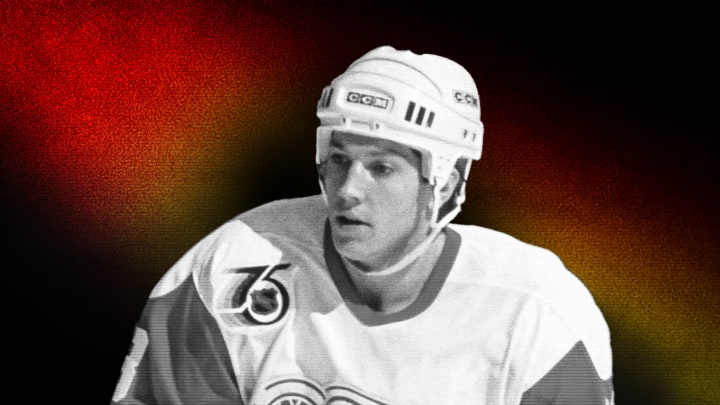
Sheldon Kennedy
This episode contains content and topics that may be difficult for some listeners. Please check the show notes for more information. Listener discretion is advised.
Sheldon Kennedy never dreamed of being a 20-year-old kid who would be in and out of psych wards. He never dreamed of being in a hospital on suicide watch, and he never dreamed of going through drug and alcohol treatment eight times. But that became his reality. From a young age, Sheldon was sexually abused by his junior hockey coach, Graham James, a prominent figure in his hockey community. And for 11 years, Sheldon struggled in silence — the first five while the abuse was going on, and the following six during which still no one else knew the truth about what had happened to him. As Sheldon rose through the ranks of professional hockey, the weight of his secret drove him down some dark paths. It wasn’t until 1996, when he came forward with what had happened to him, that Sheldon could finally see a future for himself as a husband and a father. Still, looking back on his NHL career is complicated because there are feelings of shame and guilt around who he was. What he does take pride in is the fact that he can be happy now – scars and all. In 2014, Sheldon was honored with the Order of Canada, the nation’s highest civilian ranking. And to him, that should be a symbol of hope for anyone out there struggling to become the person they did dream of becoming.
*This episode contains content and topics that may be difficult for some listeners. Listener discretion is advised. If you or someone you know is struggling, you are not alone. There are many support services that are here to help. Resources can be found at The American Foundation forSuicide Prevention (1-800-273-8255 or text TALK to 741741).
Visit Luna Child and Youth Advocacy Centre or National Children’s Advocacy Center for resources to help those who have suffered childhood sexual abuse.
You can check out Sheldon’s book, Why I Didn't Say Anything, on Amazon to learn more of his story.
About Blindsided:
Plan your work and work your plan. For many athletes, words like these are scripture — permanent signposts lining the long road to success. The very act of pursuing a career in sports often gives a sense of control, a sense of safety. Just stick to the plan. Good things will follow.
That is, until life happens. The kind of life that happens while you’re making other plans. Devastating setbacks. Dark thoughts. Debilitating breakdowns. Mental health conditions that force an athlete to ditch their well laid plans and ask, “What’s my next play?”About Blindsided:Plan your work and work your plan. For many athletes, words like these are scripture — permanent signposts lining the long road to success. The very act of pursuing a career in sports often gives a sense of control, a sense of safety. Just stick to the plan. Good things will follow.That is, until life happens. The kind of life that happens while you’re making other plans. Devastating setbacks. Dark thoughts. Debilitating breakdowns. Mental health conditions that force an athlete to ditch their well laid plans and ask, “What’s my next play?”
Hosted by former National Hockey League goaltender Corey Hirsch and psychiatrist Dr. Diane McIntosh, Blindsided allows professional athletes to open up about mental health. The podcast lets listeners hear moments when mental health became the athlete’s most important focus.
Blindsided then dives in deeper. It gets clinical. And it allows listeners to leave with a deeper understanding of mental health conditions that all people face. It then shows how athletes, in particular, face them down.
Welcome to Blindsided. Mental health. Sports. Life.
Other places to find Blindsided:
- Listen on Apple Podcasts
- Listen on Spotify



